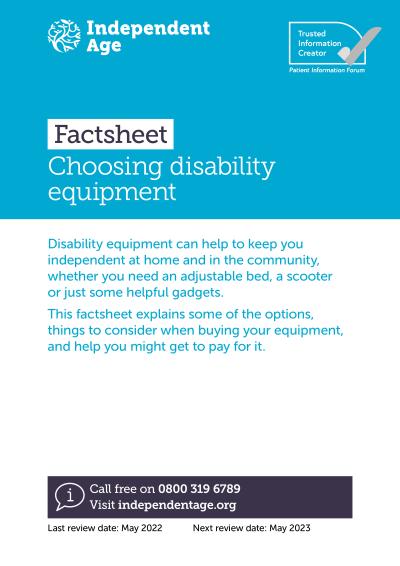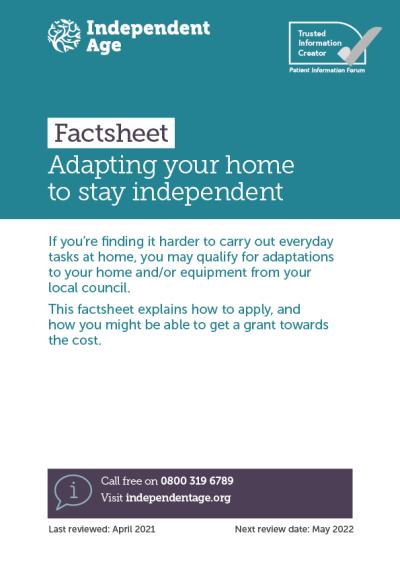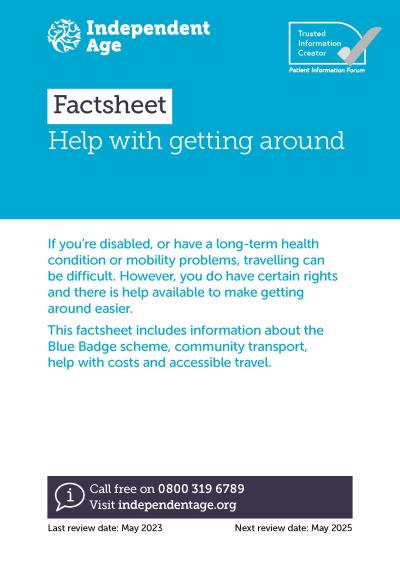Related publications

Choosing disability equipment

Adapting your home to stay independent

If you’re struggling with certain tasks or activities due to a sensory or physical impairment, there could be equipment to help you manage and stay independent. There’s a lot available, so it’s a good idea to get advice about what could help you.
If you think you could benefit from some specialised equipment or other help at home, start by requesting a free care needs assessment from the social services department of your local council. For more information on this, see Getting a care needs assessment.
A trained professional, usually in the occupational therapy team, may be involved in your assessment to help decide what equipment might help you. They will look at what tasks and activities you can still do, assess what you’re having difficulties with and consider what support you may qualify for. They may suggest solutions such as aids, adaptations or care and support.
Even if you’re planning to buy equipment privately, an assessment is a good way to find out about the different types of equipment available and get expert advice on whether they could help you.
Jot down anything you struggle with or feel unsafe doing over a few weeks, so you remember to mention them during your assessment.
There are many different types of equipment on offer, ranging from small gadgets to large items like wheelchairs. Here are a few examples:
Our factsheet Choosing disability equipment has more information on types of equipment that can help with mobility and sensory problems. The Disabled Living Foundation has factsheets on how to choose equipment for different purposes – for example, to help with dementia or cognitive impairments.
It’s always a good idea to try out equipment before you buy. Find your nearest Disabled Living Centre (also called Independent Living Centre) to try out different equipment. If you can't access a local centre, some providers offer home visits.
If you are deaf or have hearing loss, RNID have information on technology and products that could help. Visit RNIB if you have a visual impairment. Our webpage Getting around more easily has advice on getting out and about if you have a mobility problem.
Disability equipment can be expensive, but you might be able to get some help with the cost from your local council after you've had a care needs assessment. In England, your local council must provide all equipment for free. If you need minor adaptations to your property that cost less than £1,000 each to make, these must also be provided free of charge if you’re assessed as needing them. In Scotland and Wales, you may be asked to pay a ‘reasonable’ amount towards them, based on your finances.
If you need something more expensive, you may be able to get help from your council to pay for this. For more information, see our factsheet Adapting your home to stay independent.
Don’t be rushed into buying something you may not need. Some things to consider include:
If you can’t find anything for your particular needs, some charities may be able to offer tailor-made solutions, for example Remap, Designability or Demand.
The council may have preferred suppliers but you can ask for direct payments to buy the equipment yourself, if you prefer. When the council pays for a piece of equipment, they should clarify with you who owns it and who is responsible for maintenance and repairs.
If you’re paying for your own equipment, you don’t have to pay VAT on some assistive technology and disability equipment. Installation, repairs and accessories are also VAT-free. For more information, go to Gov.uk.
You could ask about paying in instalments, but check the terms because this could be more expensive in the long run. You could also consider buying second-hand equipment – you may be able to get discounts on old demonstration equipment.
Some charities offer grants for disability equipment if you’re on a low income.

Read our factsheet Choosing disability equipment for more information about the types of equipment you can get and the help you can receive to pay for them.
Our factsheet Help with getting around has advice on the support available that can make getting around easier.
The Disabled Living Foundation has factsheets on how to choose specific types of equipment.
By calling Independent Age's free and impartial Helpline, you can get information and advice from one of our friendly advisers, or order our free guides.